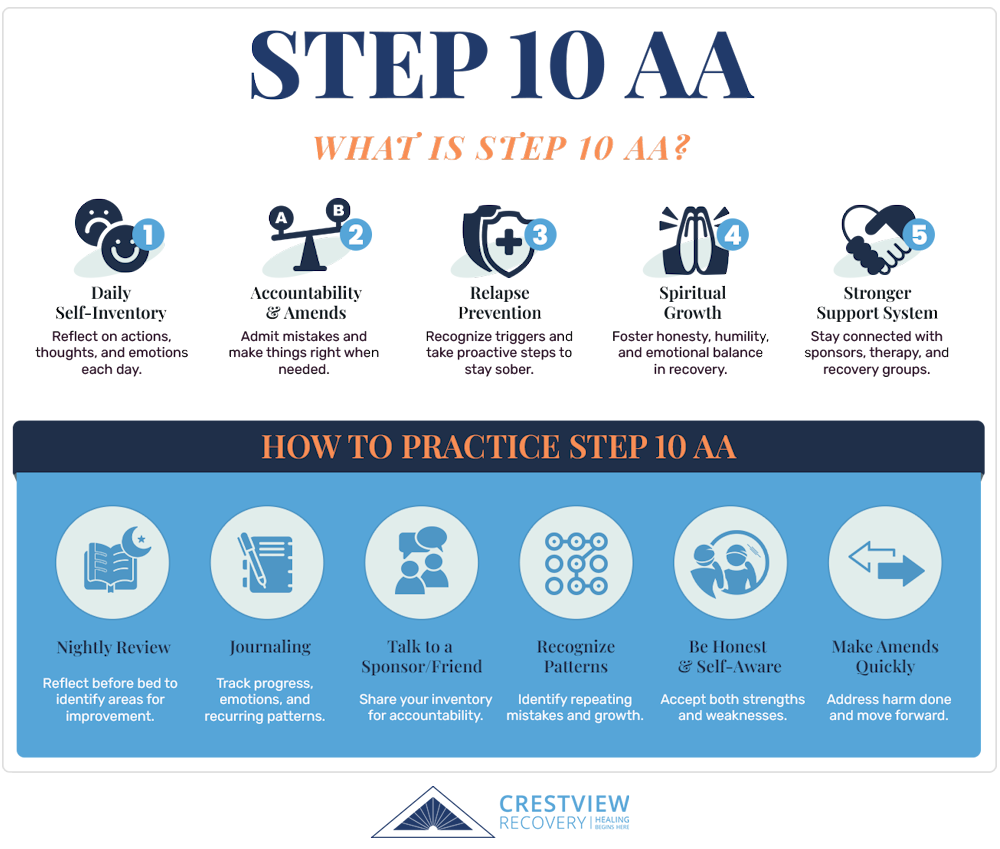Congratulations on navigating through the first nine steps of the 12-step program! Well done! But recovery is a lifelong journey, and Step 10 of Alcoholics Anonymous (AA) reminds you of that. Daily reflection and spiritual growth are crucial to overcoming addiction in the long run.
Step 10 AA challenges you to continue improving yourself through honest self-appraisal and making amends whenever needed. It may sound straightforward, but living with rigorous honesty and humility every single day takes real work.
This guide will walk you through making Step 10 AA a practical part of your daily life so you can reap the benefits of continuous progress in your recovery. If you or a loved one is struggling with substance use, consider our addiction treatment programs in Portland, OR.
What is Step 10 AA?
In Alcoholics Anonymous (AA), Step 10 is a part of the Twelve Steps, which are guiding principles for individuals in recovery from alcoholism. Step 10 AA is often summarized as “Continued to take personal inventory and when we were wrong, promptly admitted it.”
The idea behind Step 10 AA is to promote self-awareness, accountability, and ongoing personal growth for those in alcohol addiction rehab. When you reflect daily on your actions and reactions, you gain awareness and insight into behaviors that could threaten your sobriety. You can then make the necessary corrections to avoid relapse. Step 10 AA teaches you humility by showing you that you still have more progress to make in your recovery.
Practicing Step 10 AA daily means asking yourself questions like:
- Was I resentful or fearful today?
- Did I harm anyone with my words or actions?
- What could I have done better?
- Am I relying too much on myself and not enough on my Higher Power?
Step 10 AA provides the opportunity for continuous growth and spiritual development through self-reflection and honesty. By working this step daily, you build the foundation for lifelong sobriety and serenity.
Why is Step 10 AA Important in Addiction Recovery?
Step 10 AA in addiction recovery plays a crucial role in maintaining ongoing sobriety by fostering a proactive approach to self-awareness and personal growth.
Relapse Prevention
By regularly taking inventory of your thoughts, feelings, and behaviors, Step 10 AA enables you to identify potential triggers and cravings before they escalate. This proactive stance helps you implement coping strategies and preventive measures to avoid relapse. It acts as a preemptive strike against the cyclical nature of addiction.
Cultivating Accountability
Step 10 AA emphasizes the importance of promptly acknowledging mistakes and taking responsibility for them. This accountability not only facilitates personal growth but also helps rebuild trust with oneself and others. By making amends quickly, individuals in recovery can address issues head-on, minimizing the negative impact of their actions.
Self-Reflection and Growth
Regular self-reflection, a central component of Step 10, provides an opportunity to gain insight into unhealthy patterns of thinking and behavior, a crucial part of mental health treatment. This awareness is the first step toward breaking free from destructive cycles and fostering positive change. It encourages a continuous process of self-improvement and personal development.
Promoting Emotional Sobriety, Humility and Honesty
Step 10 AA is crucial for promoting emotional sobriety by encouraging healthy emotional processing in recovery. It helps individuals navigate life’s challenges without resorting to substances and fosters humility and honesty, countering ego-driven behaviors in addiction for a more balanced and grounded recovery.
Strengthening the Support System
Regular self-inventory, a crucial part of Step 10, extends beyond personal reflection. Engaging with a sponsor, participating in addiction therapy services, or joining a support group fosters connection and strengthens your support system. This collaborative approach provides valuable insights and guidance, contributing significantly to sustained recovery.
In summary, Step 10 AA is a cornerstone in addiction recovery, offering a roadmap for continuous self-improvement, vigilance, and personal accountability. By incorporating these principles into their daily lives, individuals can build a strong foundation for lasting sobriety and overall well-being.
How To Practice Step 10 AA in Your Daily Life?
There are a few simple ways to incorporate Step 10 AA into your daily routine:
- Do a nightly review. Before bed, reflect on your day and look for any moments where you could have improved your thinking or actions. Make notes and use them as motivation for the next day.
- Start a journal. Writing down your reflections helps increase self-awareness and gives you a record of your progress over time. Aim for at least a few sentences about your day, thoughts, feelings, and behaviors.
- Talk to a sponsor or friend. Verbalizing your inventory with another person provides accountability and a fresh perspective on situations. It also may be beneficial to join a support group or engage in group therapy.
- Look for recurring themes. Notice the same issues, struggles of shortcomings continue to surface in your reflections. These are areas that may need more work and growth. Don’t get discouraged-progress, not perfection!
- Be rigorously honest. For Step 10 AA to be effective, you must be willing to see yourself as you are.
- Practice self-awareness. Acknowledge both the good and the bad to gain an accurate view of where you are in your recovery journey. With practice, honesty gets easier.
- Make amends when needed. If your daily inventory uncovers a mistake, take action to remedy the situation right away. Don’t let resentment or guilt build up. Make things right and then move forward.
Overcoming Challenges and Resistance to Step 10

Overcoming challenges and resistance is key to fully embracing Step 10. This step requires honesty, humility, and vigilance, which are not always the easiest qualities to maintain! Some common obstacles you may face include:
- Denial – It can be difficult to accept our shortcomings and flaws. Confronting the truth about ourselves, however uncomfortable, is necessary for growth. Stay open-minded and willing to see yourself as you are.
- Rationalization – Our minds are great at making up excuses and justifications for our behavior. Watch out for ways you may be rationalizing your actions rather than taking responsibility for them. Call yourself out when you start making excuses.
- Complacency – It’s easy to become complacent in recovery and stop reflecting and evaluating ourselves. But vigilance and continuous self-improvement are lifelong pursuits. Make Step 10 AA a daily habit and priority to avoid complacency.
- Feeling overwhelmed – Looking closely at ourselves can bring up feelings of being overwhelmed by our faults and imperfections. Remember that self-reflection is a gradual, lifelong process. Be gentle with yourself and focus on progress, not perfection.
- Lack of motivation – Some days we just lack the motivation or willpower to do the work of self-reflection. That’s okay– just get back to it as soon as possible. Call a sober friend or your sponsor for some accountability and support. Our motivation follows action, not the other way around.
The challenges of Step 10 AA often stem from self-sabotaging behaviors and unhealthy thought patterns developed over years of addiction. With practice and commitment to honesty and humility, the resistance will fade. Step 10 AA ultimately leads to greater freedom, empowerment, and peace of mind. Keep at it—you’ve got this!
Step 10 AA for Making Amends and Personal Growth
Step 10 AA is all about daily reflection and spiritual growth. This step encourages you to continue to take personal inventory, and when you are wrong, promptly admit it. Step 10 AA is vital to staying sober because it helps you gain awareness of behaviors and thought patterns that could lead back to addiction.
Make Amends When Needed
If during your reflection, you realize you have harmed someone else, Step 10 AA encourages you to make direct amends to them whenever possible, except when doing so would injure them or others. Making amends is an important part of recovery and personal growth.
Be Honest With Yourself
Step 10 AA asks you to continue to take personal inventory and when you are wrong, admit it. This requires rigorous honesty and a willingness to face uncomfortable truths about yourself, your behaviors, and the impacts of your addiction. Self-reflection and honesty help build character and lay the foundation for sober living.
Learn From Your Mistakes
Through daily reflection, you can gain awareness of behaviors, thought patterns, or triggers that could threaten your sobriety. Then you can make a plan to avoid or address them. Step 10 AA helps you stop repeating the same mistakes and continue progressing in your recovery.
Celebrate Wins Big and Small
While Step 10 AA focuses a lot on self-reflection and improvement, it’s also important to recognize the progress you’ve made. Whether it’s achieving one year of sobriety or making it through a difficult day without relapsing, celebrate your milestones and wins. You deserve to acknowledge how far you’ve come. Staying motivated and encouraged will help ensure you continue moving forward with Step 10 AA and beyond.
Step 10 AA ultimately leads to spiritual awakening and a lifetime of sobriety by encouraging honesty, humility, responsibility, and service to others. Make Step 10 AA a habit, and watch yourself grow in recovery.
Celebrating Milestones and Progress Through Step 10
Celebrating milestones and progress is an important part of Step 10. As you continue your daily self-reflection and spiritual growth, pause to recognize how far you’ve come. These victories, no matter how small they seem, keep you motivated and committed to your recovery.
One Month
Congratulations on 30 days sober! The first month was difficult, but you did it. Reward yourself with a special treat or by doing an enjoyable activity. You deserve it.
Six Months
Six months clean and sober is a major achievement. At this point, recovery has become a habit and way of life. You’ve overcome challenges and obstacles through perseverance and dedication. Acknowledge this tremendous milestone. Do something memorable to mark the occasion.
One Year
One year sober – this is a monumental milestone! You should feel enormously proud of how you’ve transformed your life over the past year through hard work and self-discipline. Celebrate this milestone in a big way. Take a special trip or do another activity that holds meaning for you. You’ve earned it!
Long-Term Sobriety
Whether it’s 5, 10, or 20+ years, achieving and maintaining long-term sobriety is a lifelong commitment that deserves constant celebration. Engage in an aftercare program to support your recovery and become a role model for others. Share your experience, and strength, and hope to inspire them in their journey. Make the time to reflect on your progress and express gratitude for another year of health, personal growth, and freedom from addiction.
Recognizing milestones and progress in Step 10 AA provides motivation and encouragement to keep going. While daily reflection focuses on self-improvement, celebrating victories allows you to appreciate how far you’ve come in your recovery. No matter how long you’ve been sober, each day is an achievement and a gift. Be sure to pause and savor your success. You deserve it!
Empowering Your Recovery Journey with Crestview Recovery

Embark on the path to recovery with us! If you or someone you love is facing a substance use disorder, know that assistance is within reach. We stand ready to support you throughout your journey to recovery, providing various treatment options and a compassionate team of professionals.
Our commitment is to guide you toward a brighter, healthier future, ensuring you’re never alone in this process. Let’s overcome the challenges of addiction together and strive for a life of enduring well-being and fulfillment. Contact Crestview Recovery Center today!

































